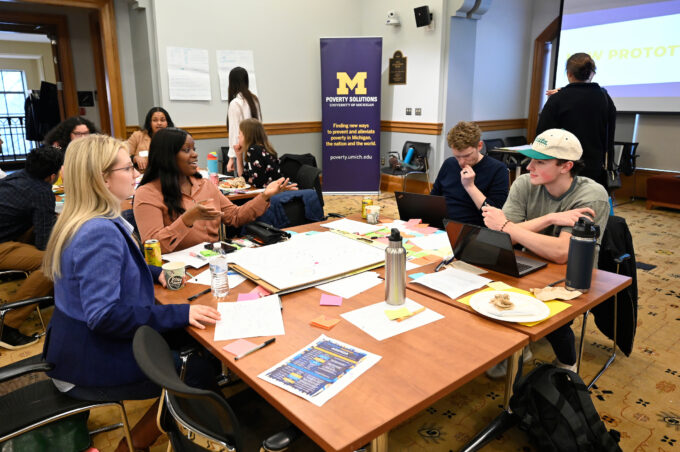Student Research Assistants – Real world experience in evidence-based poverty research and solutions

Contact: Karissa Knapp, ktknapp@umich.edu
The mission at Poverty Solutions is to partner with communities and policymakers to find new ways to prevent and alleviate poverty through action-based research. A key player in this work is University of Michigan students. Poverty Solutions research assistants (RAs) are a crucial part of the team and the work Poverty Solutions does. They work side-by-side with Poverty Solutions researchers on important projects like the Guaranteed Income to Grow Ann Arbor (GIG A2) pilot, Prosecutor Transparency Project, Flint Rx Kids, Detroit Financial Well-being Innovation Project, Investing in Us, and the Washtenaw County Opportunity Index. This last year (2023-4), 62 RAs aided Poverty Solutions work.
“The students who worked on the Guaranteed Income to Grow Ann Arbor Pilot were instrumental to the successful launch and were really the public face of the project,” said Kristin Seefeldt, associate faculty director for educational programs at Poverty Solutions. “They helped people navigate the project’s application process, checked documentation, and onboarded participants once the project was up and running. A number are working with us on the research portion of the project. We’ve received extremely positive feedback from residents and program participants about them, reminding us just how important students are to our mission.”
Through working together, Poverty Solutions also hopes to give RAs quality research experience and guidance as they figure out where they may want to go next in their career and what kinds of research they may be interested in doing.
“Research assistantships at Poverty Solutions have been a launching pad for students from across the university to careers in policy, research, nonprofit, and government work,” said Trevor Bechtel, student engagement and strategic projects manager of Washtenaw County Programs at Poverty Solutions. “Students bring a variety of specialized skills from their coursework and previous life experiences and build those skills, learning new ones while they expand our capacity, and form the engine for some of the larger projects we’ve undertaken.”
Poverty Solutions research assistants come from many schools and colleges across the university, from engineering to social work, design to medicine, business to public policy, and undergrad through post doc. Having such a range of students with different insights and knowledge involved in Poverty Solutions’ work allows more unique ideation and problem solving to tackle the challenges being researched. Below are some conversations from the RAs about their experiences at Poverty Solutions, and where they may want to go next:
What skills did you learn/grow while at Poverty Solutions?
 “I’ve worked on some research projects before this, but GIG A2 was my first experience with launching a research project. It is such a complicated process and I have so much respect for everyone on the team who was trying to plan for all of the unknowns!”
“I’ve worked on some research projects before this, but GIG A2 was my first experience with launching a research project. It is such a complicated process and I have so much respect for everyone on the team who was trying to plan for all of the unknowns!”
– Jaymie Tibbits, Social Work, 2nd year; GIG A2
 “I have some experience in doing implementation on the analysis side, and this was an excellent opportunity to learn and take part in the process earlier in the research pipeline. Being able to take part and help with the logistics and public-facing aspects of enrollment into this kind of research study was really valuable for me.”
“I have some experience in doing implementation on the analysis side, and this was an excellent opportunity to learn and take part in the process earlier in the research pipeline. Being able to take part and help with the logistics and public-facing aspects of enrollment into this kind of research study was really valuable for me.”
– Francisco Brady, Public Policy, 1st year; GIG A2
 “I also developed in learning how to exist in a role in a very large team. I understand more thoroughly the importance of clear and frequent communication with time-sensitive issues.”
“I also developed in learning how to exist in a role in a very large team. I understand more thoroughly the importance of clear and frequent communication with time-sensitive issues.”
– Andrew Wylie, Social Work, 1st year graduate student; Keep It Home
How did your work at Poverty Solutions develop or change your career interests?
 “I’m interested in policy and legislation, and this experience has really reaffirmed my belief that it’s so important to talk to people about their lived experiences. Many folks I spoke with expressed that they just feel really stuck in their current financial situation. I think as policymakers, we need to be paying more attention to the fact that it is really debilitating to feel like you have no room for mobility in your life. I think that despondence bleeds into many other areas of the health and well-being of people and communities.”
“I’m interested in policy and legislation, and this experience has really reaffirmed my belief that it’s so important to talk to people about their lived experiences. Many folks I spoke with expressed that they just feel really stuck in their current financial situation. I think as policymakers, we need to be paying more attention to the fact that it is really debilitating to feel like you have no room for mobility in your life. I think that despondence bleeds into many other areas of the health and well-being of people and communities.”
– Jaymie Tibbits, Social Work, 2nd year; GIG A2
 “[It] made me more interested in working with an organization like Poverty Solutions and/or becoming a researcher. I still have a strong interest in poverty alleviation and homelessness, so it is interesting to see how all the different Poverty Solutions projects target different facets of economic and personal well-being.”
“[It] made me more interested in working with an organization like Poverty Solutions and/or becoming a researcher. I still have a strong interest in poverty alleviation and homelessness, so it is interesting to see how all the different Poverty Solutions projects target different facets of economic and personal well-being.”
– Sadie Mrakuzic, Social Work, 1st year; GIG A2
 “My experience with SummerWorks has motivated me to explore avenues for promoting equity and youth empowerment in my future roles. As an MBA candidate at the Ross School of Business, we often talk about social impact and discuss how we can be leaders in our future jobs. … I’ve come to appreciate that impact extends beyond monetary measures. It involves providing tangible skills and opportunities that can profoundly alter the trajectories of youth in the communities we serve. Whether advocating for our firms to participate as employers or stepping up as mentors, there are meaningful opportunities to make a difference in young adults’ lives and pave the way for their success.”
“My experience with SummerWorks has motivated me to explore avenues for promoting equity and youth empowerment in my future roles. As an MBA candidate at the Ross School of Business, we often talk about social impact and discuss how we can be leaders in our future jobs. … I’ve come to appreciate that impact extends beyond monetary measures. It involves providing tangible skills and opportunities that can profoundly alter the trajectories of youth in the communities we serve. Whether advocating for our firms to participate as employers or stepping up as mentors, there are meaningful opportunities to make a difference in young adults’ lives and pave the way for their success.”
– Dominique Downs, MBA candidate, Class of 2024; SummerWorks
What would you say to students interested in working with Poverty Solutions? Or any general advice to those interested in research in this space?
 “Being an RA at Poverty Solutions is a great opportunity for professional growth. The researchers there are doing impactful work and you can be a meaningful part of it. I think it is a great way to get your foot in the door if you are interested in doing research in this space, since it is a well-known research hub. The Principal Investigator I worked for made sure that we were engaged at every part of the process and learned valuable skills. From data cleaning to interacting with participants, we had adequate training to feel empowered to handle each step. I would recommend it to anyone motivated to do research for social good.”
“Being an RA at Poverty Solutions is a great opportunity for professional growth. The researchers there are doing impactful work and you can be a meaningful part of it. I think it is a great way to get your foot in the door if you are interested in doing research in this space, since it is a well-known research hub. The Principal Investigator I worked for made sure that we were engaged at every part of the process and learned valuable skills. From data cleaning to interacting with participants, we had adequate training to feel empowered to handle each step. I would recommend it to anyone motivated to do research for social good.”
– Sadie Mrakuzic, Social Work, 1st year; GIG A2
 “I would say that working at Poverty Solutions is a good option for students who are looking to gain exposure to interdisciplinary research and access to researchers who are passionate about honoring and centering the communities they research. My general advice to everyone starting a research position is don’t be afraid to ask questions, nobody will bite!”
“I would say that working at Poverty Solutions is a good option for students who are looking to gain exposure to interdisciplinary research and access to researchers who are passionate about honoring and centering the communities they research. My general advice to everyone starting a research position is don’t be afraid to ask questions, nobody will bite!”
– Francisco Brady, Public Policy, 1st year; GIG A2
 “I would advise anyone interested in working in this research space to come with an open heart and a curious mind. The research team I worked with was incredibly thoughtful and took a lot of care setting up the study in a way that centered the participants’ unique experiences. There was a very clear distinction from the start that the participants we would be working with are PEOPLE first. Poverty Solutions really embodies how I think all researchers should approach their work, with an inclusive focus on the lives of those they are trying to learn from. Lastly, I was so proud to work on a project that was designed to intentionally disrupt some of the bureaucratic systems that act as barriers to autonomy for many people living in poverty. This experience helped me to envision a system of social services rooted in justice and respect, to use as a blueprint for the future.”
“I would advise anyone interested in working in this research space to come with an open heart and a curious mind. The research team I worked with was incredibly thoughtful and took a lot of care setting up the study in a way that centered the participants’ unique experiences. There was a very clear distinction from the start that the participants we would be working with are PEOPLE first. Poverty Solutions really embodies how I think all researchers should approach their work, with an inclusive focus on the lives of those they are trying to learn from. Lastly, I was so proud to work on a project that was designed to intentionally disrupt some of the bureaucratic systems that act as barriers to autonomy for many people living in poverty. This experience helped me to envision a system of social services rooted in justice and respect, to use as a blueprint for the future.”
– Jaymie Tibbits, Social Work, 2nd year; GIG A2
If you’d like to learn more about student opportunities at Poverty Solutions, please visit our student page for more information on the Poverty Solutions certificate and research opportunities, or email Trevor Bechtel at betrevor@umich.edu.
Interested in more? Sign up for the Poverty Solutions Student Newsletter – be sure to indicate “Student Involvement.”
